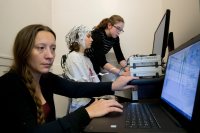
Scientist, panel to discuss DNA testing and identity
The Bates College Office of Multicultural Affairs presents a lecture and panel discussion titled Does Your Identity Fit Your Genes? at 7 p.m. Monday, Feb. 4, in the Edmund S. Muskie Archives, 70 Campus Ave. Following the talk and discussion, seven members of the Bates community, including students, faculty and staff from different geographic areas and ethnicities, describe what DNA tests have revealed about their own origins and what impact these results have on their definitions of identity.
The public is invited to attend the presentation at no cost. For more information about the DNA presentation, please call the Office of Multicultural Affairs at 207-786-8376.
In the lecture opening the event, Dr. Rick Kittles, associate professor of medicine at the University of Chicago’s Division of Biological Sciences, presents his pioneering work in tracing the ancestry of African Americans via DNA testing.
Kittles’ research evaluates genetic mechanisms involved in complex diseases. His work explores how genetic variation is structured across human populations and how that variation contributes to variation occurring between two or more individuals in disease susceptibility and other phenotypes such as drug response and skin color.
Currently his work explores sequence variation within candidate genes in well-characterized populations for prostate and breast cancer, cardiovascular disease and human pigmentation. His interests include biological and socio-cultural issues related to “race” and health disparities and the use of admixture mapping for genes for common traits and disease in African Americans and Hispanic Americans.
Kittles formerly co-directed the molecular genetics unit of Howard University’s National Human Genome Center. He received his Ph.D. at George Washington University in 1998, and began assembling genetic data from published studies and collecting DNA samples in Africa.
Kittles found that his “female line goes back to northern Nigeria, the land of the Hausa tribe. I then went to Nigeria and talked to people and learned a lot about the Hausa’s culture and tradition. In a way, it grounded me,” he said. However, Kittles has a Y-chromosome common in Germany, not Africa. “My father had told me for a long time that I had a white ancestor on our paternal line. So the test confirmed it goes back to Germany,” he said. Thirty percent of African Americans’ Y-chromosomes originated in Europe.





